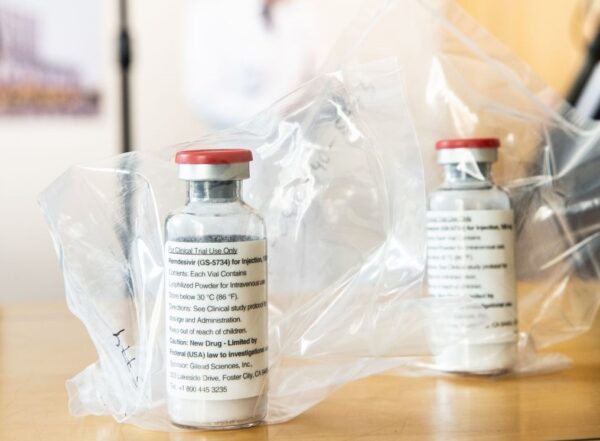
The first company to get an emergency use authorization for an antiviral to treat the virus that causes Covid-19 has announced plans to price the drug well below the expectations of a prominent U.S. drug-pricing watchdog, but in line with those of investment bank analysts.
In an open letter Monday, Gilead Sciences CEO Daniel O’Day wrote that the Foster City, California-based biotech company would price the drug, remdesivir, at $390 per vial for governments of developed countries, yielding a list price of about $2,340 per patient, assuming a five-day treatment course that uses six vials. The price for private insurance companies in the U.S. will be $520 per vial – for a total of $3,120. O’Day explained that the difference in price was because of how the U.S. system is set up and because of the discounts expected by government payers in other countries, but that the company expects all patients to have access to the drug at the price that was set.
Shares of Gilead were up 2.8% in pre-market trading on the Nasdaq following the news.
“Part of the intent behind our decision was to remove the need for country by country negotiations on price,” O’Day wrote. “We discounted the price to a level that is affordable for developed countries with the lowest purchasing power. This price will be offered to all governments in developed countries around the world where remdesivir is approved or authorized for use.”
In developed countries outside the U.S., drugmakers must negotiate prices for drugs with government agencies. This is especially true in much of Europe, where even after securing regulatory approval from the European Medicines Agency, they must then negotiate prices with each individual member nation, a process that often results in drugs becoming available to European patients some years after they reach the market in the U.S. Several generic drug companies are making versions of remdesivir for developing countries. The company got an EUA from the Food and Drug Administration last month.
Still, even the price for the U.S. is well below what the Institute for Clinical and Economic Review, a drug-pricing watchdog, forecast at the beginning of May, when it found that remdesivir’s price ceiling would have to be $4,500 in order for the drug to be cost-effective.
In a note to investors, RBC Capital Markets analyst Brian Abrahams also wrote that despite the higher price for commercial payers in the U.S., the blended price accounting for discounts across reimbursers would likely bring the price down to the same level as what Gilead is offering developed countries outside the U.S. The price O’Day named appears to be in line with expectations, Abrahams wrote, noting also that Gilead was more careful about articulating its rationale for pricing than it has been in the past with hepatitis C drugs. Assuming sales of all 1.5 million treatment courses, and around two-thirds of those being monetizable, Gilead could rake in about $2.3 billion in revenue from the drug this year, he wrote.
Another analyst, Baird’s Brian Skorney, also wrote that the price was below investors’ expectations, while commending the company for pricing the drug for access.
“We believe that the announced pricing is likely below investors’ expectations but enough to not be a disappointment,” Skorney wrote. “At the same time it is under what we think would be considered a reasonable value-based argument and should avoid broad-based disapproval from all but the sharpest pharma critics.”
Photo: Ulrich Perrey, Pool/AFP, Getty Images












